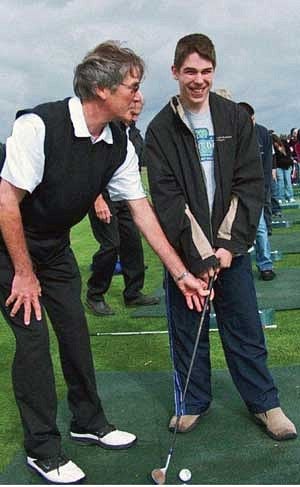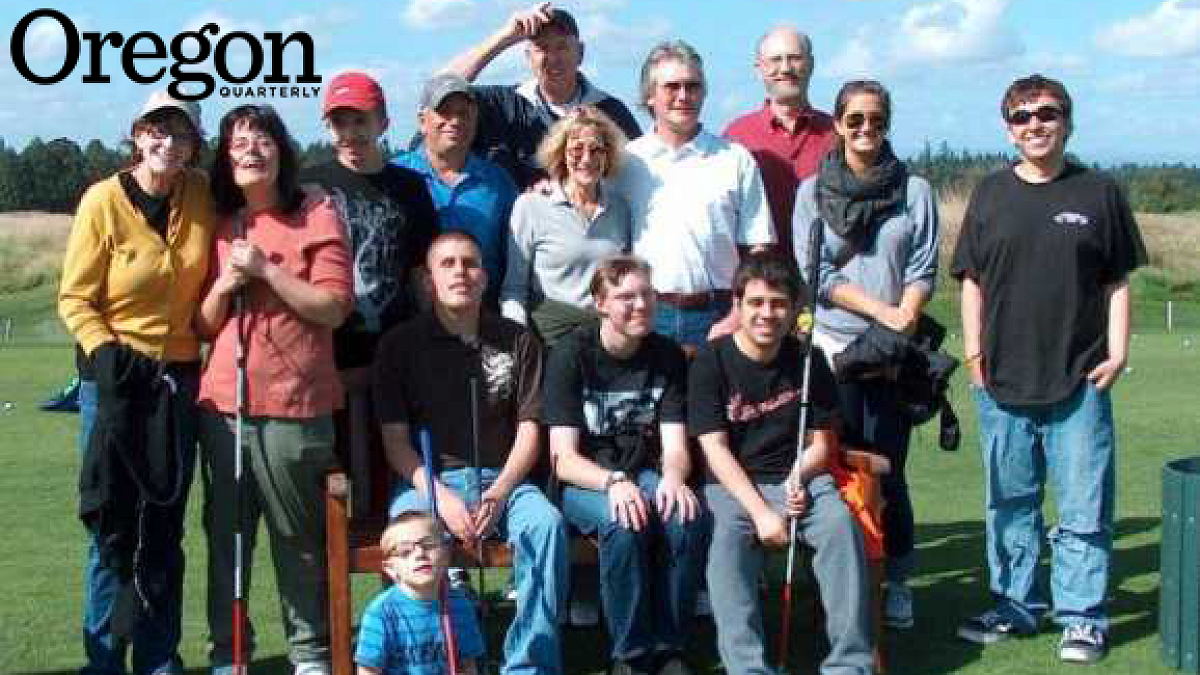In September 2003, Ron Plath was a legally blind man seeking a purpose when he happened upon it at an Oregon golf course. Arriving at Willamette Valley Country Club outside Portland with his wife, Carolyn, Plath had planned to follow a group of friends playing in a fundraising tournament for the Oregon Lions Sight and Hearing Foundation. But children's voices instead drew him toward the club's practice range, where volunteer instructors were conducting a golf clinic for blind and visually impaired kids.
Listening to the instructors, Plath immediately realized he was the right guy with the right background to contribute to these kids' growth, development, and opportunities. He was a lifelong golfer who had continued to play the game despite losing most of his central vision to a progressive retinal disease called macular dystrophy; he had been an elementary-school teacher before deteriorating sight had prompted his retirement; and he had taught disabled students while pursuing a master's degree in adaptive physical education at Oregon several years earlier.
At a break in the clinic, Plath volunteered to help. For the next two hours he taught students from Oregon and Washington schools for the blind the basics of his favorite pastime and emerged transformed. "I don't think life-changing is too strong a word," he says of the experience.

These efforts have coincided with his emergence as one of the world's best visually impaired golfers. Within days of witnessing the 2003 Willamette Valley clinic, he competed in his first United States Blind Golf Association national championship. "I was nervous, but I was fairly confident that I wouldn't completely embarrass myself," he says. Quite the contrary. While vying—with help from a sighted coach—against other visually impaired players and their coaches, he won five consecutive national crowns starting in 2004 and a world title in 2008. Plath's wife and father have been among those who have coached him in competition, a role that entails helping with alignment, judging distances, and watching shots. (Playing recreationally on familiar courses, he relies on his peripheral vision and periodic help from his regular playing partners.) With his tournament victories, Plath has gained self-assurance that he strives to impart to his students. "Being able to play golf at a certain level breeds confidence," he says, "even for the kids who have some success just hitting the ball. I'm hoping that carries over into other parts of their lives."
Offered at the Children's Course in suburban Gladstone, Plath's First Tee clinics typically include a group of eight to 10 students from the Washington State School for the Blind and public school districts, most of them teenagers and some with multiple disabilities. Plath and other volunteer instructors start by explaining the game's tools and terminology, letting students feel different clubs and a ball before leading them on a walkabout to introduce course features. On the practice green, instructors teach kids how to roll the ball into the hole with a putter, starting from just a few inches then moving farther away incrementally. Eventually, students learn the full swing, with Plath and other instructors taking a hands-on approach to teach the proper motion. "A lot of times they just pick up [the club] like they're chopping wood, because they don't understand the rotation part of it," Plath says. "They've never seen [a swing], so you have to demonstrate that." After they drill the kids on various techniques, the instructors coach their students on properly striking the ball. Although students usually whiff several times at first, when they finally connect, they burst with joy. "That's why we do this," Plath says. "Their happiness at making contact, they don't hide it. It's immediate."
Plath's own path unfolded quite differently; it took him years to find fulfillment after specialists diagnosed him at 30 with macular dystrophy, a disease that typically strikes older patients. Before his diagnosis, which he had difficulty accepting at first, the Eugene native taught fifth and sixth grades in Beaverton. As his vision worsened, making reading increasingly difficult, he began teaching physical education, but within a few years his students' faces became difficult to recognize from a distance. By 1987, just three years before President George H. W. Bush signed into law the Americans with Disabilities Act, Plath's declining vision impelled his premature retirement. "When I lost my job it was devastating," he says. "Thirty-seven is fairly young, and I wasn't ready to do nothing. Saying I was lost for a few years would be a fair comment." In this period, Plath worked in a golf retail store and launched a fundraising venture producing golf calendars. Sixteen years passed before he discovered he could help kids with golf.
Plath had unwittingly prepared for his future mission by enrolling long ago—while he was still teaching—in the UO's master's degree program in adaptive physical education. As part of his studies, he instructed special-needs children in schools, including a wheelchair-bound boy named Danny. After teaching him basketball skills, Plath learned the boy was Stephen "Danny" Downs, who became paralyzed after his mother, Diane Downs, shot him and his two sisters in Springfield in 1983. (One of Danny's sisters died, and a jury later convicted Diane of murder, attempted murder, and criminal assault.) Nearly three decades later, Plath considers the encounter a wonderful lesson. "I thought, 'His mother did this, and he knows his mother did this, and he still has an attitude where he's going to move forward,'" he says.
Although Plath's difficulty reading and the lack of assistive technology available at the time prompted him to forego the exam required to earn his master's degree, he believes his studies made his current endeavors possible. "I don't think there would be a Northwest Blind Golfer Foundation without my experience at the U of O," Plath says.
Through the foundation, Plath has introduced many kids to golf, among them Tanner Deck. A legally blind freshman at the Washington State School for the Blind, the 15-year-old began participating in Plath's clinics as a seventh grader. "At first I thought, 'I'm visually impaired, how am I going to do this?'" Deck says. "Then I tried it and thought, 'This is fun.'" As a result of the clinics, Deck has begun playing golf with help from his father, Joe, and other family members. Although Plath realizes it is difficult for most visually impaired children and youths to take up golf in earnest without significant support from others, he strives to expose them to the possibility. And it is kids like Deck who fuel his efforts. "I know how much playing golf with my dad meant to me," he says. "If Tanner turned out to be the only one [to take up golf] out of all this, it's still worth it."
With a focus on ability rather than disability, Plath has broadened outlooks for many visually challenged kids. "Ron has been such a shining example of what you can do as a visually impaired person," says Adrienne Fernandez, the Washington State School for the Blind's recreation specialist. "He instills in the students not only his love for the game, but the ability to go out and have fun and be with friends. The joy of the game trickles down into the joy of life, and Ron exudes that."
—By Mike Cullity


